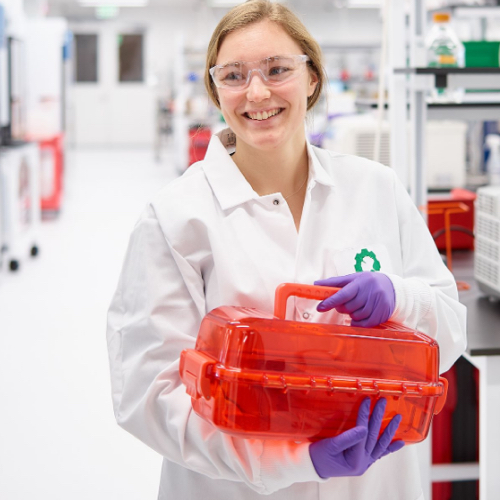The global biotech community has come together during the pandemic to develop and deliver multiple effective and safe vaccines for COVID-19. However, more than two thirds of the global population has yet to be vaccinated – one way to reach the rest of the world is through enabling more scalable production of the raw materials needed to make vaccines. Today, I’m excited to announce our collaboration with Aldevron, a world leader in manufacturing mRNA vaccines and raw materials. We’ve been working with them since earlier this year to optimize the production of an important component often required to manufacture mRNA vaccines and therapies: the vaccinia capping enzyme (VCE).
Through our collaboration, Aldevron is now able to produce over 10 times more VCE per batch than the previous process, a significant manufacturing breakthrough for this critical component.
Aldevron, who has a successful history manufacturing high-quality components for genetic medicines, has the exclusive rights to the protocol conditions for this newly developed manufacturing process.
When placed in our bodies, mRNA vaccines use ribosomes—the cellular machinery that reads and translates mRNA into useful proteins—to produce a viral antigen. Human mRNA is “capped,” meaning the beginning of the mRNA sequence is modified with a 7-methylguanylate molecule. This specific cap structure needs to be added to mRNA vaccines and therapeutics to ensure the mRNA is recognized by our ribosomes and prevent premature degradation of the mRNA. VCE is a common tool for adding this specific cap structure to mRNA in vaccine manufacturing. However, it’s typically expensive and difficult to produce in mass quantities. In partnership with Ginkgo, Aldevron is working to ensure that there are sufficient quantities of VCE to meet rising vaccine demands.
This manufacturing improvement is an exciting milestone for Ginkgo as we continue to expand the capabilities of our cell programming platform to enable customers in the pharmaceutical ecosystem to improve their products and manufacturing processes. Aldevron has been a great partner with us on improving VCE, which we believe is a key ingredient to scaling mRNA production globally. This breakthrough represents a momentous growth opportunity for them as they continue to bolster their expansive portfolio of products.
Tom Foti, President of Aldevron’s Protein Business Unit, shared his excitement: “I’m very excited about combining the additive strengths of Ginkgo Bioworks’ development expertise and Aldevron’s manufacturing horsepower to yield an optimized manufacturing method for vaccinia capping enzyme. Historically, this enzyme has been difficult to produce, and we believe this yield breakthrough will accelerate mRNA therapeutic and vaccine development for manufacturing teams around the world.”


